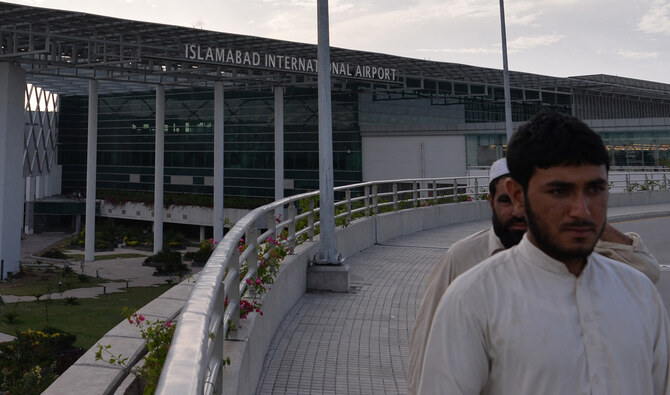ISLAMABAD: The Islamabad High Court (IHC) on Wednesday gave another chance to ex-premier Imran Khan to respond to contempt charges brought against him after he made controversial remarks against a district judge while addressing a public rally earlier this month.
A five-member bench of the court, headed by chief justice Athar Minallah, heard the case and directed Khan’s counsel Hamid Khan to submit a fresh response within seven days as the court was not satisfied with the response already submitted where Khan, who is also the Pakistan Tehreek-e-Insaf (PTI) party’s chairman, said he was willing to take back his words.
“I have already submitted my response in the court,” the ex-premier told reporters in the courtroom when asked if he would tender an unconditional apology in the case.
The court issued a show-cause notice to the former premier last week after he allegedly threatened a judge at an Islamabad rally on August 20. Khan severely criticized female judge Zeba Chaudhry along with senior police officials for detaining his chief of staff, Dr. Shahbaz Gill, since he said his aide was tortured in custody.
A police report of the rally quoted Khan as saying he “would not spare” Islamabad’s police chief and the judge. “The purpose of the speech was to spread terror among the police and the judiciary and prevent them from doing their duty,” the report added, as the police booked the top PTI leader under anti-terrorism laws.
“We are giving you the opportunity. We want to proceed ahead but we are also bound by law,” the chief justice remarked while giving another seven days to Khan’s counsel to submit the fresh reply.
Justice Mian Gul Hassan Aurangzeb, a member of the bench, remarked the case should have concluded today, adding it could not happen due to the nature of the response.
“Whatever you want to respond, write it down carefully,” the chief justice said. “Please do appreciate the gravity of the matter.”
Expressing dissatisfaction over Khan’s response, the chief justice said the written response submitted in the court was not “appropriate to the stature of Imran Khan.”
He said the court was always open to fair criticism, but this was the matter of integrity of the judiciary, adding the bench would ensure utmost transparency in the court.
Responding to social media criticism on the opening of his court on the night of April 9 when a no-confidence motion was being processed in parliament against Khan, the chief justice said the court was opened to uphold the constitution and prevent the possibility of another coup in the country.
Addressing the torture allegations against the police, the chief justice said Gill’s case was pending in the court when Khan made his controversial comments against the judge in his rally.
“The worst form of torture is enforced disappearances,” he remarked. “Unfortunately, the executive has been encouraging that for the last seventy years.”
Earlier, Khan arrived at the court where security had been beefed up. All roads leading to IHC had also been blocked with barbed wires. The PTI chairman was also accompanied by his lawyers and aides, Faisal Javed Khan and ex-foreign minister Shah Mahmood Qureshi.
In an informal conversation with the reporters inside the courtroom before the beginning of the hearing, he expressed surprise over the closure of shops and heavy contingents of the security personnel around the court ahead of his appearance.
“They are so terrified that they have closed all this,” Khan said. “What was the need for all this heightened security?”
“Today, we have also not called in our workers [to gather outside the court for solidarity],” he continued.
The ex-PM, who came into power in 2018 and was ousted in April in a no-confidence vote in parliament, face the risk of being disqualified for life from politics if convicted of insulting the judge.
Khan and his party have denied the contempt charges, saying that cases against the former prime minister were politically motivated.
In a response to the high court’s show-cause notice on Tuesday, Khan said his words at the rally “were uttered spontaneously without any previous motive and malice only to emphasize that the rule of law should be strictly followed in the matter of Shahbaz Gill by the authorities.”
The ex-prime minister did not apologize to the court but added that he was willing to take back his words if they were deemed inappropriate.
“The respondent submits with humility that if words he uttered are regarded as inappropriate, he is willing to take them back,” he said.
















